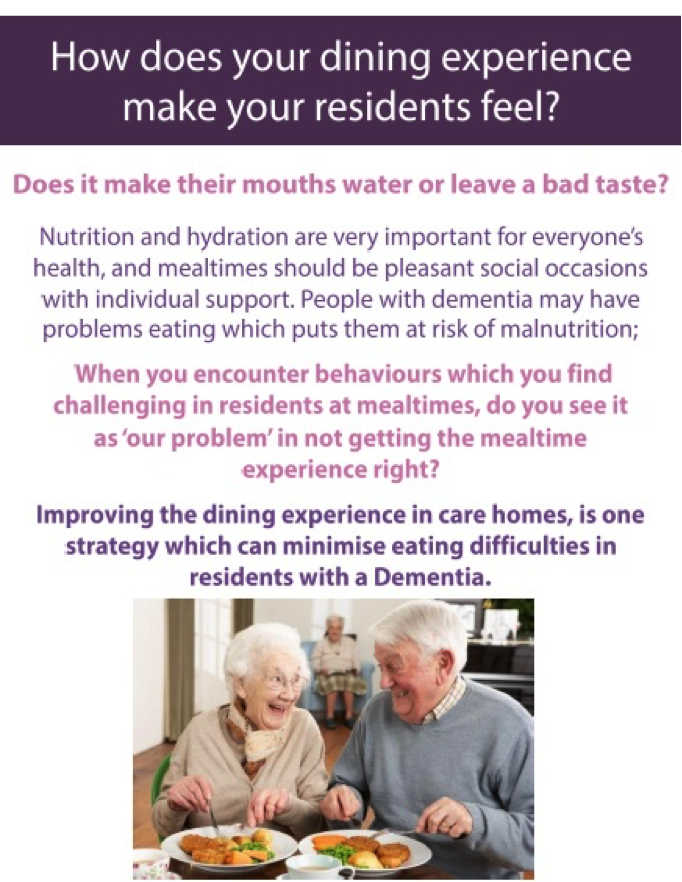Our top 10 recommendations to help you to improve the dining experience for people you support with Dementia
This week is Nutrition and Hydration Week, a week committed to focusing energy, activity and engagement on nutrition & hydration as an important part of quality & safety in health & social care settings.
Every day this week we will be bringing you our best practice tips, helpful advice and more, designed to give you inspiration to improve nutrition and hydration levels for the people you support.
 Part of our Dignified Dining Solutions Guide
Part of our Dignified Dining Solutions Guide
Our top 10 recommendations to help you to improve the dining experience for people you support with a Dementia.
Dining rooms should be welcoming and homelike and everything about them should prompt recognition and that it is time for a meal.
1) The environment can cause anxiety and confusion for people living with a Dementia, for whom disorientation and bewilderment are a common experience. Incorporating the use of highly visible contrasting colours pictorial signage helps to establish a clear route to the dining room.
2) Food themed reminiscence images can provide a powerful memory trigger to help stimulate appetite and renew interest in food.
3) Pictorial menu boards are the most effective way to communicate different meal options available, providing helpful encouragement and supporting good nutritional intake.
4) Make eating a social activity: sit down and eat together. We know from decades of research that we are more likely to eat more in a group situation than eating on our own. Let people choose where they would like to sit and eat and sit with them at eye level either in front or to the side of them.
5) Audit your noise levels at mealtimes - noisy environments can be very distracting for people with a Dementia and can lead to reduced nutritional intake - dining rooms should be free from loud music, television and vacuum cleaners.
One of our customers recently observed that by making simple changes to the way they managed their mealtime experience meant that their residents were clearing their plates rather than picking at food, and they have seen improved nutrition levels and less food wastage.
6) Familiar sounds and smells of cooking can help to stimulate the senses such as the tinkling of cutlery and rattling the pots and pans.
7) Use plain tablecloths, and lay the table with placemats and cutlery and if you can, get the people you support involved in helping to set tables at mealtimes.
8) We all eat with our eyes first! - food should always be visually appealing incorporating different colours and appetising presentation , including pureed meals.
9) Make the effort to maintain people’s dignity and independence with eating and drinking by providing suitable aids i.e. adapted cutlery and crockery, nonslip mats and keep warm plates for slow eaters.
10) Use brightly coloured crockery and drinking vessels to support people and make food and drink more visible and appetising. This will enable improved nutrition and hydration and increase the social benefits of mealtimes.
If you've missed our previous blogs discussing key topics on nutrition and hydration and would like more help and tips to improve your residents’ dining experience and improve their nutrition and hydration levels, check out our blogs here.
Also please feel free to pop back each day during #nutritionandhydrationweek as we share best practice advice on these important issues and we’d love you to join our mailing list where we regularly share the knowledge and experience we have gained working in the care sector for over 25 years, helping to keep you in touch with new and innovative solutions which support safety and dignity for the people you support.
You can also order your copy of our Dignified Dining Solutions Guide, designed to help people with a Dementia to eat better, by calling us on the number below.
As always, you can contact us on 01773 713713 or sales@hcsuk.co.uk to discuss how we can help you and those in your care.
If you would like to learn more about Nutrition&Hydration week and get involved yourselves then head on over to their website and join the global challenge! https://nutritionandhydrationweek.co.uk
 Nutrition and Hydration Week Logo
Nutrition and Hydration Week Logo



